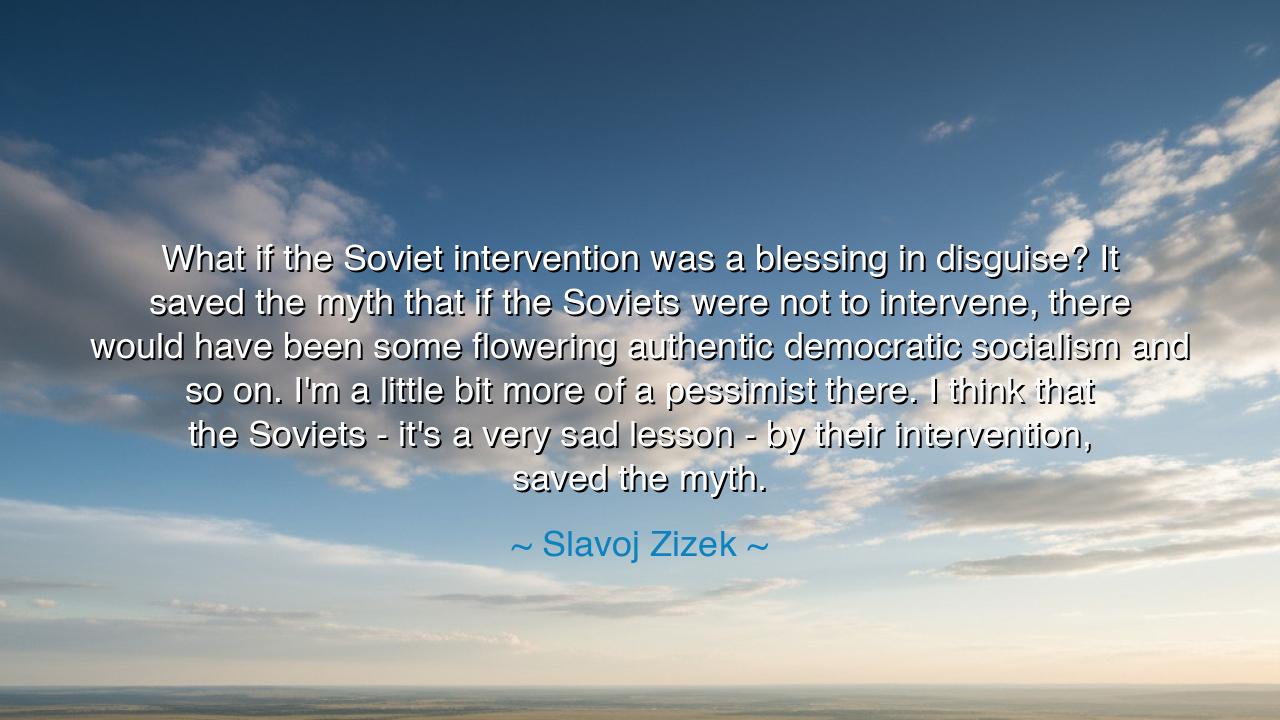
What if the Soviet intervention was a blessing in disguise? It
What if the Soviet intervention was a blessing in disguise? It saved the myth that if the Soviets were not to intervene, there would have been some flowering authentic democratic socialism and so on. I'm a little bit more of a pessimist there. I think that the Soviets - it's a very sad lesson - by their intervention, saved the myth.






In the scrolls of history, the words of Slavoj Žižek resound like the cryptic utterances of an oracle: “What if the Soviet intervention was a blessing in disguise? It saved the myth that if the Soviets were not to intervene, there would have been some flowering authentic democratic socialism and so on. I’m a little bit more of a pessimist there. I think that the Soviets—it's a very sad lesson—by their intervention, saved the myth.” Here lies a paradox, bitter as wormwood yet instructive as fire. For sometimes it is not the fulfillment of a dream that preserves its power, but its very denial. The myth lives on, untouched by the corruption of reality, because history, with ruthless hand, cut it down before it could wither of its own weakness.
Let us speak plainly of the Soviet intervention in Prague, in the year 1968, when tanks rolled over the cobblestones of Czechoslovakia. The people dreamed of a socialism with a human face, a gentler order where freedom and equality could embrace. Yet before this fragile flower could bear fruit, it was crushed beneath iron treads. Žižek’s wisdom whispers that this destruction, though cruel, preserved the dream untested. For had it lived, it might have revealed its frailty, its internal contradictions, its inability to endure the harsh winds of reality. Better, then, for some, that it was slain as a martyr, than exposed as a weakling.
This lesson echoes through time. Recall the Trojan War, when the walls of Troy stood unbroken for ten years, fortified by hope and legend. Only when the horse entered the gates did the people see their doom. Had Troy fallen earlier, by storm or by surrender, it might have lived forever in glory, its myth untarnished. But because it endured and fell by trickery, its nobility was questioned. So, too, with the dreams of men: sometimes reality, by denying fulfillment, allows a vision to live in purity, unsullied by failure.
Žižek, in his pessimism, does not rejoice in this truth, but he does not flee from it. He calls it a “sad lesson,” for it reminds us that human ideals, noble as they are, often falter when tested. The dream of democratic socialism, radiant and pure in thought, might have stumbled in practice, revealing flaws that would embitter its adherents. Instead, the intervention fixed it in memory as an eternal “what if,” a shining horizon forever out of reach. Thus, the very act of suppression became its strange savior.
From this we learn that myths are not merely falsehoods, but living forces that move nations and stir the soul. The mother who tells her child that greatness lies within, even if the child never achieves it, passes on strength by belief alone. The myth need not be proven to be powerful; indeed, often when it is tested, it loses its shine. We must, therefore, weigh carefully what we wish to see realized, and what we would rather keep as guiding star.
Consider, too, the story of Moses and the Promised Land. He led his people for forty years through desert and trial, yet he himself never set foot in the land of milk and honey. By being denied its sight, his mission became not a tale of possession but of faith, of endurance, of vision. So it is with human ideals: sometimes it is the very absence of fulfillment that gives them their eternal strength. The Soviet intervention, tragic though it was, became such a denial—transforming a fragile political experiment into an immortal idea.
The lesson, then, for those who live and breathe in this age, is this: cherish your myths, but know their nature. Do not demand that every vision prove itself in the harsh light of reality, lest its magic fade. Yet neither must you be enslaved by illusions. Instead, let your myths guide your steps, while your reason governs your actions. Seek to test your dreams where possible, but hold them gently, knowing that their beauty may lie not in their perfection, but in their power to inspire.
And so I say to you, children of tomorrow: walk the path between hope and realism. Let your ideals call you upward, like distant constellations, but do not despair when the earth resists. If history teaches us anything, it is that even crushed flowers may perfume the air for centuries. The myth, preserved by tragedy, can still nourish courage, imagination, and longing. Live with this paradox, embrace it, and you shall be wiser than those who demand only certainty, for certainty belongs to the grave, but myth belongs to the living.






AAdministratorAdministrator
Welcome, honored guests. Please leave a comment, we will respond soon